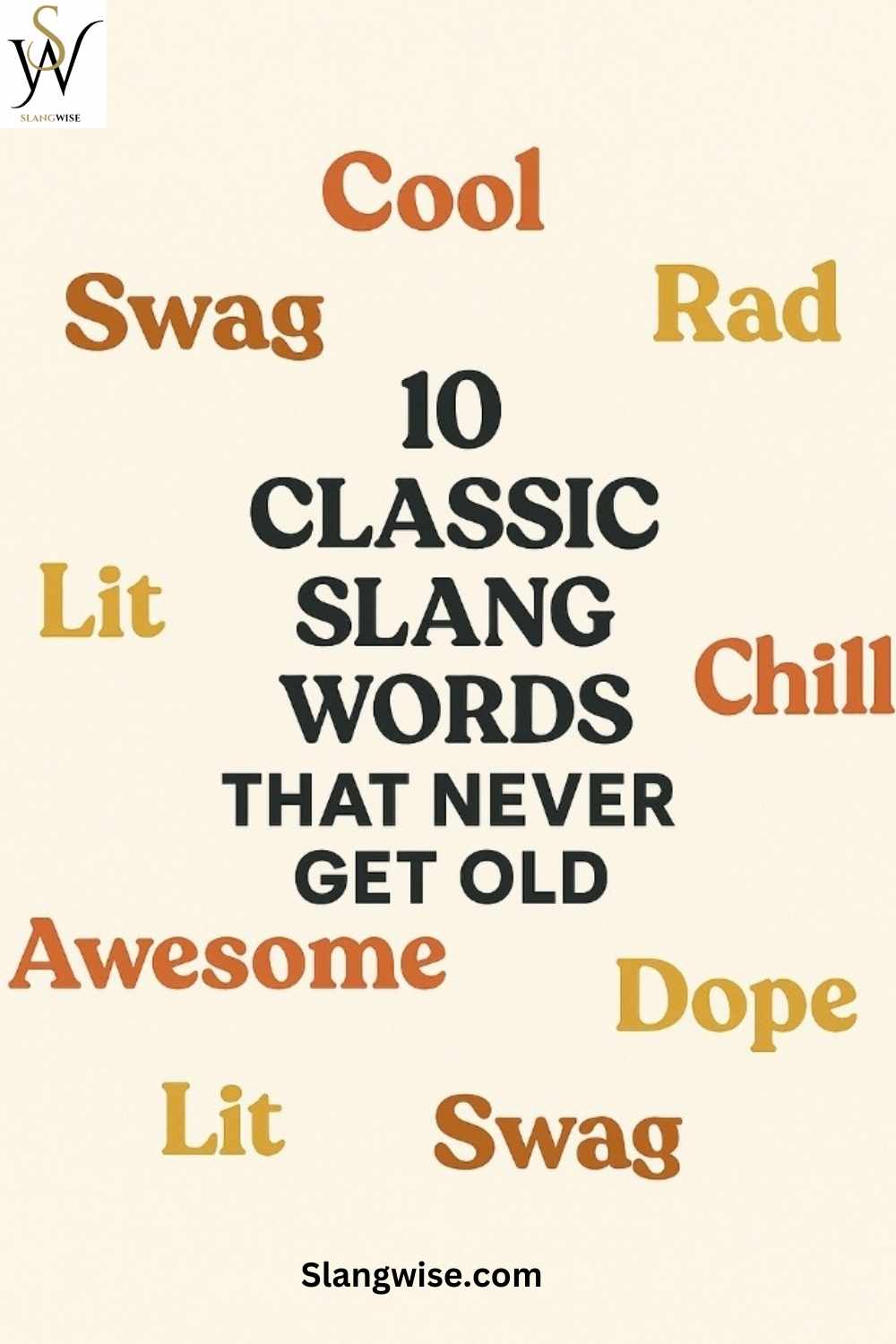Ever since I have been studying and decoding internet lingo, I learnt that slang is the pulse of everyday language, informal, dynamic, and always evolving.
Yet some slang words and phrases withstand generations, becoming cultural touchstones that instantly convey attitude, humor, or camaraderie.
From mid-century classics like “cool” to more recent staples like “rad,” these ten timeless slang words have carved out a permanent home in our everyday lexicon.
In this post, I’ll share with you 10 classic slang words, examine their origins, see how they’re used today, and uncover why they remain evergreen.
Just if you’re a language lover or simply want to sound effortlessly familiar, these slang gems will never steer you wrong.
Slangwise Tip: “Dropping a well-placed classic slang word adds instant flair, no need to overdo it; less is more.”
Table of Contents
In A Nutshell
- The 10 classic slang words are: Cool, Rad, Groovy, Hip, Chill, Dope, Awesome, Lit, Swag, Wicked.
- Classic slang often emerges from music, film, or subcultures (e.g., jazz, surf).
- Many terms trace back to mid-20th-century American youth culture.
- Evergreen slang survives because it expresses universal feelings succinctly.
- Proper usage hinges on tone and context, avoid forced or outdated combinations.
10 Classic Slangs Terms That Never Get old
1. Cool
Meaning: Excellent, fashionable, or composed.
Origin: Jazz culture of the 1940s–50s, used to describe a laid-back style or sound (“cool jazz”). Jazz historian Ted Gioia notes “cool” became mainstream by the 1950s through Miles Davis’s Birth of the Cool sessions.
Usage: “That jacket is so cool.” “Stay cool under pressure.”
Slangwise Tip: Use ‘cool’ as a versatile compliment, adjectival or adverbial (‘cool move,’ ‘coolly delivered’).
2. Rad
Meaning: Radical; outstanding or impressive.
Origin: Surf and skate culture of the 1970s and ’80s in California. Skateboarding magazine Thrasher popularized “rad” in early issues, capturing surf’s adventurous spirit.
Usage: “That trick was rad!” “Rad playlist you made.”
Slangwise Tip: “Pair ‘rad’ with energetic tone, ideal for sports or creative feats.”
3. Groovy
Meaning: Excellent, fashionable, or harmonious.
Origin: 1960s counterculture and jazz; “in the groove” meant playing well.
Usage: “That beat is groovy.” “Feeling groovy today!”
Slangwise Tip: “Invoke retro vibes, best for music, art, or laid-back moods.”
4. Hip
Meaning: Knowledgeable, fashionable, or in-the-know.
Origin: African American jazz and blues communities in the 1930s–40s; from “hep” meaning well-informed.
Usage: “Stay hip to the latest trends.” “That band is really hip.”
Slangwise Tip: “Use ‘hip’ sparingly, overuse can feel dated. Best in cultural or trend contexts.”
5. Chill
Meaning: Relaxed, easy-going, or to relax.
Origin: 1980s party culture; possibly from “chill out” in music and film scenes.
Usage: “Let’s just chill tonight.” “He’s a chill guy.”
Slangwise Tip: “‘Chill’ works as verb or adjective, mix it into invitations or descriptions of personality.”
6. Dope
Meaning: Excellent, impressive, or cool.
Origin: Hip-hop culture of the 1980s; originally meaning “excellent” in street slang.
Usage: “That new album is dope.” “Your ride looks dope.”
Slangwise Tip: “Use ‘dope’ to praise artistic or bold choices, fits music, fashion, and tech.”
7. Awesome
Meaning: Inspiring awe; extremely good.
Origin: Early 20th-century “awesome” in general English solidified as slang in post-WWII youth slang.
Usage: “That view is awesome.” “You did an awesome job.”
Slangwise Tip: “As the most universal classic, ‘awesome’ suits almost any positive context.”
8. Lit
Definition: Exciting, excellent, or intoxicated.
Origin: Late 2000s hip-hop and party culture; “lit” meaning “intoxicated” then broadening to “exciting.”
Usage: “This party is lit.” “Her performance was lit.”
Slangwise Tip: “Watch context: ‘lit’ for energy, but ensure alcohol references are clear.”
9. Swag
Definition: Style, confidence, or cool demeanor.
Origin: 2000s hip-hop (“swagger” shortened to “swag”).
Usage: “He’s got swag.” “That outfit is pure swag.”
Slangwise Tip: “‘Swag’ pairs well with visual flair, use when discussing style or presence.”
10. Wicked
Definition: Very good or impressive (in some regions, also “evil” or “excellent”).
Origin: New England dialect in the early 20th century, popularized by Boston youth in the 1980s–90s.
Usage: “That concert was wicked!” “She’s wicked talented.”
Slangwise Tip: “Employ ‘wicked’ for emphatic praise, regional charm adds warmth.”
Why Classic Slang Endures
- Emotional Precision: They express attitude, cool, admiration, excitement, in a single word.
- Cultural Anchors: Tied to music, film, and youth movements, they carry nostalgia and identity.
- Versatility: Many terms function as adjectives, verbs, or nouns, fitting diverse contexts.
- Global Reach: Through media, these words transcend borders, entering everyday speech worldwide.
Using Classics in Modern Conversation
- Gauge Your Audience: A teen may find “groovy” charming or ironic; a Boomer might use it sincerely.
- Mix Old with New: Blend classics with current slang (e.g., “That drop was lit, truly rad”).
- Keep Natural Tone: Avoid forcing terms; let them arise organically in dialogue.
- Embrace Regional Flair: Use “wicked” or “dope” authentically if it aligns with your background.
Concluding Thought
10 classic slang words have proven their staying power across decades and continents. Whether you’re looking to add retro flair, express yourself succinctly, or simply appreciate language history, these timeless terms offer both clarity and charm.
Use them wisely, mix in new lingo, and you’ll be fluent in both past and present slang, always ready to capture the perfect feeling in a single word.
FAQs
Yes, most are recognized through movies, music, and Internet throwbacks.
If overused, possibly. Balance with modern expressions and conversational context.
Explore era-specific media (’60s music, ’80s films) and online glossaries like Green’s Dictionary of Slang.

